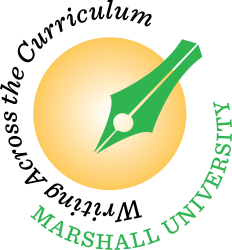This statement is the initial portion of the Faculty Senate recommendation to create the WAC program in 1994.
What is WAC?
The philosophy of Writing Across the Curriculum as a teaching methodology can be summed up in one phrase: student involvement. Created to reinforce writing skills in classes outside of English composition, this academic movement engages students directly in the subject matter of the course through a variety of activities that focus on writing as a means of learning. Some of these activities are informal, ungraded class exercises that teach (among other things) critical thinking, organization and synthesis of diverse elements, summarizing skills, and awareness among students of their own learning processes. Other activities, formal and graded, teach these same skills through careful revision and rethinking, peer evaluation, and reformulation into a finished product. These class projects use writing as a means of engaging the mind, body, and spirit of students in the activity of learning a particular subject matter. The forms, which this writing takes, are entirely dependent upon the kinds of writing current and useful in the specific discipline and the goals of the specific course.
In this way, writing is not added to content, but the content is entered and secured through writing. In other words, both teaching and learning are directed toward specific projects carefully created and monitored by the instructor so that students, by doing these projects, acquire the skills and knowledge of the content of the course as set forth in the course objectives. The success of a Writing-Across-the-Curriculum program, therefore, depends far more on the instructor’s professional commitment to a style of teaching which has active learning as its goal than it does on adherence to any particular formula. Whether carried out through groups of students or by individuals, learning in these courses is active because students must create something of their own to learn.
Goals
The goals and the products of a Writing Across the Curriculum program need to be viewed from the perspectives of those people involved in or affected by this learning process: (1) the students, (2) the faculty, and (3) the university. Though the learning process is a unity involving all of these parts, it is helpful, nevertheless, to look at what can be achieved for and by each of these constituencies.
WAC for Students
Writing-Across-the-Curriculum classes make students aware that writing is a necessary and frequently used skill no matter what their occupation will be, and they prepare students for writing in their careers and in their personal and community lives. Students in a well-coordinated and well-monitored Writing Across the Curriculum program will develop these abilities:
- to think clearly and express thoughts precisely;
- to pose worthwhile questions;
- to evaluate the adequacy of an argument;
- to use, apply critically, and move easily among facts, inferences, and opinions;
- to understand how truth claims are established in a discipline;
- to deal with ill-formed problems and quandaries;
- to give and receive criticism profitably;
- to agree or disagree by measure;
- to extend a line of thought beyond the range of first impressions; and
- to articulate a complex position in a way that adds nothing to its complexity.
These abilities, as put to use in disciplinary subject areas, help students achieve deepened mastery of these subject areas and marketable skills that are readily transferable to life beyond college. WAC for Faculty
WAC for Faculty
One of the lasting effects of a Writing-Across-the-Curriculum program for the faculty of an institution is the creation of community. This teaching community is made up of individuals who have diverse pedagogical styles and strategies but who share the common goal of improving classroom learning. Teaching in such a program cannot be carried on in isolation but requires group discussion and sharing of techniques, common reexamination of learning methodologies, and working in teaching partnerships. This program provides a forum, very much needed at Marshall University, where teachers regularly can discuss pedagogy and, as almost always happens, make their way across disciplinary boundaries to discover common questions, problems, and solutions. Through the workings of community, Writing Across the Curriculum develops in individual faculty members an introspective and self-aware way of thinking about their teaching, which they automatically translate into effective classroom practices.
WAC for the University
No single program can further the university’s mission to the public more than Writing Across the Curriculum. Through it students become educated readers and writers who do not work in mental isolation but who actively look for connections among all of their life’s pursuits and the world around them.
